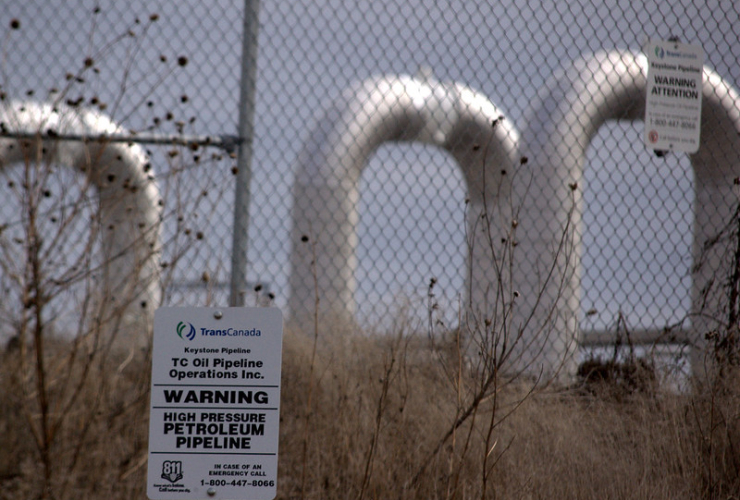U.S. President Joe Biden is "leaning to a greening” of the economy.
The cancellation of the Keystone XL pipeline was among his first orders of business. A call to environmentally driven ally Justin Trudeau was also on Biden’s immediate to-do list. We are all expecting the new American president to place more emphasis on the "economy of environment” than the previous administration.
Countries around the world are setting aggressive targets to slash carbon emissions, and the COVID-19 pandemic has only highlighted the link between the burning of fossil fuels and the cleanliness of the air we breathe. We’ve seen it clearly, in dramatic satellite photos from space.
Our resilience as a species is being tested in so many ways as we begin 2021. Innovative companies across the globe that have been able to adapt, be sustainable, and embrace a forward-looking view are thriving and creating jobs.
Canadian companies are very much in the mix. The green tech sector is surging, growing quickly. There’s money to be made from a cleaner economy. There are jobs to be created through concerted efforts to slash greenhouse gas emissions and reward those who develop the enabling technology, along with those who invest in those solutions. Hydrogen is topping the list of predicted breakthrough industries as we begin the new year.
The Ontario government is setting its sights on a hydrogen economy, with a goal of lowering carbon emissions and generating new jobs. British Columbia is partnering with the trucking industry in the CleanBC Heavy-duty Vehicle Efficiency Program, which offers cash rebates to truckers and fleet operators who install technology to reduce emissions from ever-polluting diesel engines.
The transportation sector puffs out nearly a quarter of all carbon emissions in Canada. And we can slash those emissions immediately with the application of hydrogen-based innovations.
Canadian companies like dynaCERT are aggressively marketing and furthering technologies that deliver immediate cuts to emissions from dirty diesel with a device that reduces carbon emissions by up to 57 per cent when used on transport trucks, buses, mining equipment, and other diesel engines. The hydrogen-based innovation also reduces fuel consumption by nearly 10 per cent, which saves on costs and pays for itself within 12 months.
The B.C. government is helping truckers and fleet owners by offering $4,000 to install such devices, covering nearly half the cost.
But the federal and other provincial governments are slow to act. Too slow. They need to embrace these world-leading innovations that are creating well-paying jobs and contributing to the reduction of greenhouse gas emissions.
Now more than ever — as we look to get our economy up and running post-COVID — there is opportunity for governments to reposition Canada as a leader in clean tech, and the hydrogen-economy offers huge potential.
From carbon credits to hydrogen-based fuels, the government has industry options other than oil. The cancellation of Keystone XL doesn’t have to be a death knell for Canadian jobs. We can innovate. We must be creative in financing, examining the power of tools, such as flow-through shares for enterprises that offer products to support the green economy.
Reputable advocates across the country are urging the federal government to act quickly. For example, Canada CleanTech Alliance is a network of more than 200 companies, accelerators, and associations.The list of established industry leaders is respectable. Among them: ACTIA, Echotech Quebec, Foresight and OCTIA (Ontario Voice of Clean Technology), the TSX Venture Exchange, and public clean-tech companies that have commercialized products in clean tech.
Let’s rewind to this March 2020 tweet by Catherine McKenna, minister of infrastructure and communities: “After we get through COVID-19, the world will have a choice. Respond with an economic & jobs recovery stimulus that jump starts the clean economy & creates meaningful jobs ... or not.”
Canada is notorious for trailing other nations when it comes to investments in R & D. The time for stagnation is long past. If COVID-19 has shown us anything, it’s that we must be prepared for future economic shocks by creating a strong foundation of technology-driven economic activity. Our society, our health, and our economic well-being depend upon it.
Jim Payne is president and chief executive officer of dynaCERT and an advisory board member for Sparta Capital Ltd.
This article reads like
This article reads like thinly disguised propaganda for hydrogen greenwashing. The zero-emission economy will doubtless have a small place for hydrogen--but not in cars and trucks, probably not in transportation at all, and it certainly won't be a great big deal. The current wave of hydrogen talk is financed by the fossil fuel industry and I'm really not interested in giving a platform to propagandists.






Comments